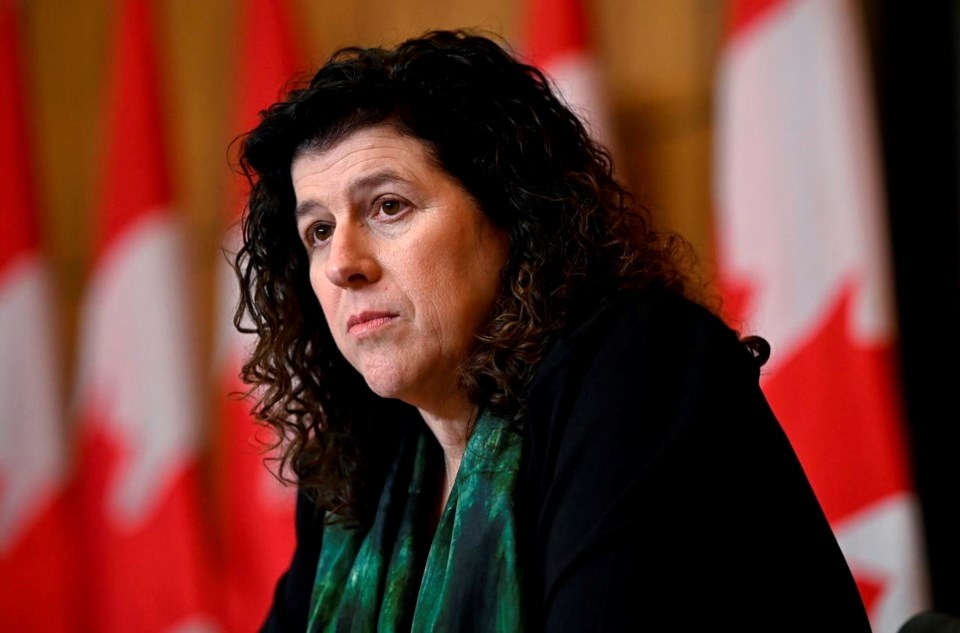IQALUIT, Nunavut — Canada's auditor general says early findings in a review of child and family services in Nunavut were so alarming that her office immediately raised concerns with the territorial government.
A report by Karen Hogan released Tuesday found the territory is failing to protect vulnerable children and youth and to provide support to families, front-line workers and communities.
“This report is more than statistics, trends and a compilation of facts — it is an urgent call to action," Hogan said during a news conference Tuesday in Iqaluit.
Among the findings were that the territory inadequately responded to reports of suspected harm, did not complete many investigations, did not sufficiently monitor the welfare of children in care, failed to meet obligations for the health and safety of employees, and could not provide accurate numbers of children in its care.
In a sample of 26 children placed in 15 foster homes, for example, the report found many cases where staff from the Department of Family Services failed to check in every six weeks as required. The report noted gaps between six to eight months for eight children in four homes. For 10 children in six homes, the department did not check in for at least a year.
The report said those gaps meant the department did not know about the children's well-being, whereabouts or the kind of care they were receiving. In the case of two children who the department had not contacted in four months, they were no longer living in their foster placement. The department also did not know two children were living with a parent who had lost custody until a month after they moved back.
The report said there was also no evidence the department took action when it became aware 10 children in foster care were experiencing suicidal thoughts or had attempted suicide or were at risk of sexual abuse or physical harm.
The report also found many cases where the department had not carried out care plans for children and youth in need of protection.
In one case, a young child needing protection due to physical abuse by a parent was allowed to remain in the home while the parent was required to attend mental health counselling. The department, however, did not follow up for more than a year and a half, until it received another report of physical abuse. The child was then placed in foster care, but the report said the department again failed to follow up.
This is the third time in the past 12 years that the auditor general's office has raised serious concerns about services for children, youth and families in Nunavut.
A 2011 auditor general report found the territorial government was not adequately fulfilling its key responsibilities for the protection and welfare of children. Its recommendations included ensuring adequate staffing, training, managing workloads, complying with standards, collecting and analyzing information on children in care, and community engagement.
A 2014 report following up on those recommendations found some progress had been made, but there were still serious gaps when it came to complying with key child protection standards. It said the territory was also still not consistently collecting basic information on children in care and had done little to engage parents and communities in the development of its child welfare strategy.
The new report found several root causes have contributed to "this persistent and chronic crisis." They include long-standing issues with funding, housing and office space for employees, and timely training for front-line workers, compounded by poor information management practices.
"I'm a mom of two, so to hear this at first I was very sad and then I was very mad by the fact that you know this could go on for so long and not be addressed," Hogan said.
Rather than giving formal recommendations, the report called for an immediate whole-of-government approach to address the challenges.
"We felt that our previous recommendations have not yet been addressed and that the typical approach was not the right one," Hogan said.
Nunavut Minister of Family Services Margaret Nakashuk said her department takes full responsibility for the report.
"It's a very heavy report, but we also have to take this opportunity to see what we can do as a government to improve the services for Nunavummiut," she said, adding supports are needed from all departments.
Premier P.J. Akeeagok said it will require systemic change to address the problems outlined in the report.
"It's our job as the government to look after the most vulnerable. And when we're dealing with children, we have to do everything within our powers to provide that support," he said.
Also Tuesday, Hogan released a report on COVID-19 vaccinations in Nunavut. It found several territorial departments worked together to quickly and equitably deliver vaccines across Nunavut, on average taking two weeks to deliver doses from the time they arrived in the territory.
The auditor general found, however, that efforts were hampered by the lack of a pandemic plan and insufficient monitoring and reporting systems. It said the lack of an inventory management system meant the Department of Health could not account for 19,500 doses, or 16 per cent, meaning while it reported 15 per cent of doses had been wasted, actual wastage could be as high as 31 per cent.
“To strengthen its response to future pandemics and mass vaccination efforts, the Government of Nunavut needs to set up proper information systems, including an inventory management system,” Hogan said.
“This would also improve the delivery of health-care services to Nunavummiut and reduce the burden on an overstretched workforce.”
The Nunavut government has accepted the recommendations .
This report by The Canadian Press was first published May 30, 2023.
— By Emily Blake in Yellowknife
___
This story was produced with the financial assistance of the Meta and Canadian Press News Fellowship.
The Canadian Press



